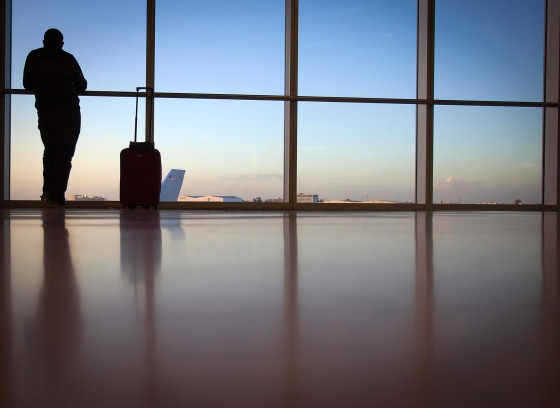The federal government lacks an effective system for allowing people to get off the no-fly list who are put there by mistake, a federal judge ruled Tuesday.
The ruling came in a lawsuit filed by 13 American citizens and permanent residents, including four military veterans, who have been barred from flights to or from the United States or over U.S. airspace. Many of them have been told they're on the government's no-fly list.
Sign up for breaking news alerts from NBC News
Each of them applied for relief under the Department of Homeland Security's Traveler Redress Inquiry Program, but Judge Anna Brown of Oregon said the program is so lacking in providing fairness that it's unconstitutional.
If the government mistakenly puts someone on the list, the judge said, the redress process "does not provide a meaningful mechanism for travelers who have been denied boarding to correct erroneous information in the government's terrorism databases."
Those who file a complaint are merely told, after the government considers it, that the review has been completed. It does not reveal whether a person's name was on the no-fly list in the past, remains on it or has been removed.
Without knowing what information the government relied on, the judge said, a traveler has no way to contest or correct what may be a mistake. "Without proper notice and an opportunity to be heard, an individual could be doomed to indefinite placement on the no-fly list."
The Obama administration had argued that the risk of errors is low because of extensive quality controls and frequent reviews of the names on the list. But Judge Brown noted the case of Rahinah Ibrahim, a Malaysian architect, who successfully sued when she was wrongly put on the list after a federal agent checked the wrong box on a form.
Given the low standard for putting a name in the master terrorism database from which the no-fly list is derived, the judge said, the process "contains a high risk of erroneous deprivation" of constitutional rights.
The judge stopped short of telling the government what changes must be made in the redress process but gave both sides three weeks to work out a resolution to the dispute. The ACLU, which filed the lawsuit, praised the ruling.
"This excellent decision also benefits other people wrongly stuck on the no-fly List, with the promise of a way out from a Kafkaesque bureaucracy causing them no end of grief and hardship," said Hina Shamsi, an ACLU lawyer who worked on the case.
The Justice Department said it was reviewing the decision.
